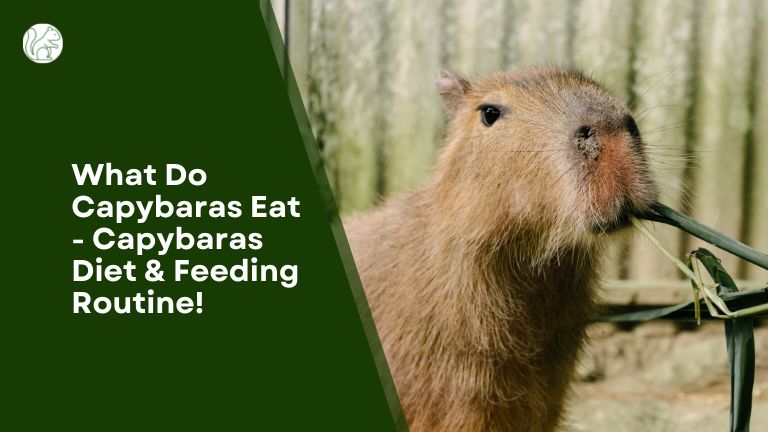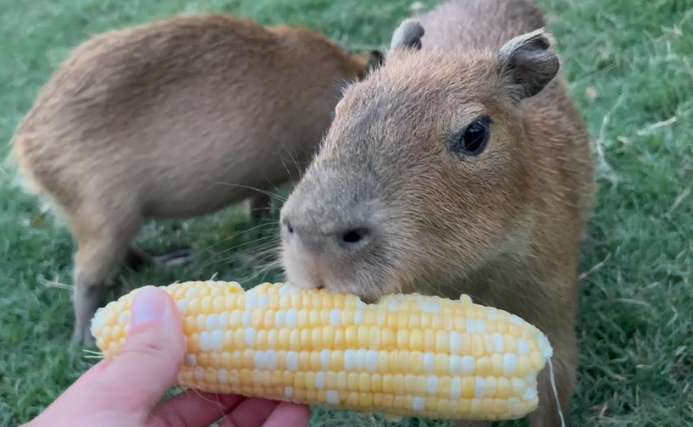If it’s about first timers, all pet people get in trouble feeding the little capybaras during pet sessions. I can relate to this as the right food habit is key to keeping them healthy.
So, what do capybaras eat? They survive on various kinds of grasses, hays, fruits, melons, veggies, potatoes, and enough amount of water. However, if the season changes, their food needs to be different to survive outside. FYI, they will eat their own waste sometimes.
If you want to know the food names in detail, then keep on reading till the end to understand everything and then leave!

The Complete Diet of Capybaras
In fact, all capybaras eat veggies, herbs, and plants (meaning herbivorous creatures) in general. I’ll show you the meal habit of capybaras based on regular, seasonal, and occasional states.
Regular Diet Habit
In their daily eating sessions, they can take anything in front of them in hunger state. However, the capybaras will eat chosen food which helps them get the needed nutrition. Here’s the detail:
- Basic Foods:
- Grass (Cameroon and Napier grass)
- Hay (Cassava hay)
- Fruits:
- Sweet corn with husks and cob
- Apples
- Carrots
- Bananas
- Melons:
- Watermelon
- Cantaloupe
- Summer melon
- Muskmelon
- Zucchini
- Crookneck pumpkin
- Yellow squash
- Field pumpkin
- Various Kinds of Potatoes:
- Sweet potatoes
- Vitelotte
- Yukon Gold potato
- Bintje
- Laura potato
- King Edward potato
- Ratte potato
- Tubers
- Greens:
- Kale
- Arugula
- Bok choy
- Spinach
- Collard greens
- Cabbage
- Romaine lettuce
- Mustard greens
- Chard
Seasonal Diet Habit
If you observe water hogs eating habits in different seasons, it’s clear that they change their routine to cope with the weather and maintain the right nutrition. Take a look at the given data to understand the matter:
- In monsoon (wet season), the water hogs eat grass and hay (basic foods) most of the time.
- In the hot summer (dry season), they consume reed plants which are abundant.
- In winter (cold season), the capybaras take water and don’t eat food except for hay. It’s because they consume more food during the summer and are able to use the nutritional value of that time to spend in the winter just like cows ruminate function.
Occasional Diet Habit
In order to fulfill the needs for Vitamins C and protein, they sometimes eat their own poop. This helps them to get bacterial guts flora to easily digest cellulose (as they consume a lot of grasses and hays). Plus, it supports their body to maintain a natural diet.
Do You Know: Capybaras eat approximately 3 – 3.6 kg (6.6 – 8 lbs.) per day to stay in a healthy state.
What Is Capybaras Favorite Food?

Out of all, the cutey capybaras can love foods that have fruitful and sweet smells. Feeding these foods will help you become friends with them easily. I’ll list down all the foods that they love and are healthy for feeding if you are petting them.
- Usual Foods:
- Dandelions
- Bamboo
- Pears
- Yogurt
- Crimped oats
- Steamed oats
- Guinea pig food
- Water hyacinth
- Probiotics
- Equine senior feed
- Purina rodent feed
- Treats:
- Raisins
- Dried cranberries
- Blueberries
- Grapes
- Sunflower seeds
- Cereal
- Granola bars
- Fruit popsicle
- Milk replacer (made for goats that are suitable for water hogs of any age)
Warning: It is suggested to feel capybaras treats on occasion. If you increase the level of these kinds of food, they can face severe illness by affecting their digestion system.
What Can Capybaras Not Eat – The Forbidden Food List
There are a few foods that might not help water hogs get good nutrition and the proper amount of protein. And these are not good for health either and can cause serious health complication which is harmful. Let me show you some of them so you cut them from the list:
- Peanuts are a big NO for their diet routine.
- Avoid feeding them sunflower seeds on a daily basis since high-fatty foods are worst for the capybaras.
- Do not let them eat bird seeds either.
- Any sort of candy or junk food like fried corn, potatoes, or other veggies is a bad choice.
- Get rid of sugary foods from their daily meal list since it’s not good for them too.
Frequently Asked Questions
1. What do capybaras eat in the rainforest?
In the tropical and amazon rainforests, the capybaras eat basic foods like various kinds of grasses and hays. Their food habit is similar to the wet season diet.
2. Do capybaras eat oranges and lemons?
Yes and no! In wildlife, the capybaras won’t touch let alone eat oranges or lemons. But, in captive life, a few zookeepers sometimes feed them oranges and lemons that help their body to get Vitamin C.
3. Do capybaras eat animals?
No, they don’t eat animals! However, the male water hogs aka capybaras can bite small animals like puppies, snakes, and so on to protect themselves as they become terribly aggressive.
Wrap Up
From the view of a pet owner, it’s necessary to learn what do capybaras eat and the right food habits.
By collecting these details, be sure to feed them properly at the right amount, not less or more. If possible, write these down or copy them to your notepad to always check before feeding.
Key Points:
- Capys choose foods that are rich in protein and low in fat/cholesterol.
- Mostly, eats basic foods aka hays, dry reeds, and grasses.
- Based on the season, occasion, and regular diet, they change their eating habits.
Hope this guide helps you to know the needed stuff and find it informative. Catch You in Next Guide!
